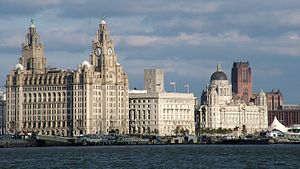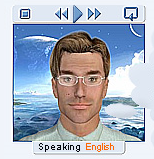Paco's dream comes true: Did Paco find in Liverpool what he was looking for?
This topic covers the following grammar points:
1) Past Simple in interrogative form (section 1),
2) Past Continuous in interrogative form (section 2),
3) Countable and uncountable nouns (section 3),
4) The particles some and any (section 4),
5) Quantifiers (section 5).
 |
| By Flums. C. Commons. |
 |
| By Chowells. GNU license. |
Liverpool (pronounced /ˈlɪvəpuːl/) is a city and metropolitan borough of Merseyside, England, along the eastern side of the Mersey Estuary. It was founded as a borough in 1207 and was granted city status in 1880. Liverpool has a population of 435,500, and lies at the centre of the wider Liverpool Urban Area, which has a population of 816,216.
Historically a part of Lancashire, the urbanization and expansion of Liverpool were largely brought about by the city's status as a major port. By the 18th century, trade from the West Indies, Ireland and mainland Europe coupled with close links with the Atlantic Slave Trade furthered the economic expansion of Liverpool. By the early 19th century, 40% of the world's trade passed through Liverpool's docks, contributing to Liverpool's rise as a major city.
 |
| By Chowells. GNU license. |
Inhabitants of Liverpool are referred to as Liverpudlians but are also known as "Scousers", in reference to the local dish known as "scouse", a form of stew. The word "Scouse" has also become synonymous with the Liverpool accent and dialect. Liverpool's status as a port city has contributed to its diverse population, which, historically, were drawn from a wide range of peoples, cultures, and religions, particularly those from Ireland.
In 2004, several areas throughout the city centre were granted World Heritage Site status by UNESCO. Referred to as the Liverpool Maritime Mercantile City, the site comprises six separate locations in the city including the Pier Head, Albert Dock and William Brown Street and includes many of the city's most famous landmarks.
From Wikipedia.
Remember that the verb to be and the defective verb can, don't need the auxiliary verb did to form the Simple Past. They have their own negative and they are inverted to do interrogative sentences. Look at the examples below to clear your doubts.
Did you understand everything?
That is a question in the Past Simple. Come with us and learn more about them.
Remember that, whenever you want to know the pronunciation of any word or phrase, or if you want to practice pronunciation, you can write something under Mike and he will pronounce it for you!
 |
| Click here to ask Mike |